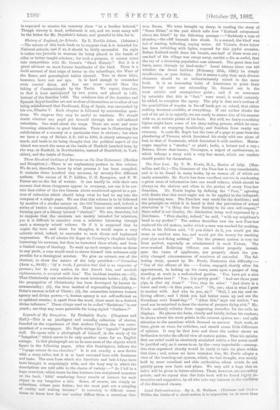Legends of My Bungalow. By Frederick Boyle. (Chapman and rfall.)—This
is an intelligent and amusing collection of stories, founded on the experience of that modern Ulysses, the war corre- spondent of a newspaper. Mr. Boyle strings his " legends " together well. He opens with a photograph of himself, )13 the study of his "bungalow," which seems to be only another name for an English cottage. In this photograph are to be seen most of the objects which figure in the following pages. After this frontispiece, follows the "Voyage autour de ma chambre." It is not exactly a now device with a story-teller, but it is at least executed here with freshness and taste. The area from which the furnituie and bric-dsbrac have been brought is surprisingly wide, and the hazy way in which the descriptions are told adds to the churn, of variety :—" As I loll in a huge armchair, which bears its date between two sculptured monsters on the back, ' ION,' wandering fancy recalls or invents for each object in my bungalow a tale. Some, of course, are simply re- collections, others pure fiction ; but the most part are a mingling oS reality and waking dreams." It certainly is difficult some- times to know how far our author differs from a notorious Ger- man Baron. We were brought up sharp, in reading the story of " Some Skins," at the part which tells how " Katland outspanned above the kloof," by the following passage :—" Suddenly a roar of thunder,—the cliff beneath him shook. In a second, the kIoof was full of tearing, bellowing, raging water. All Victoria down below has been twinkling with lights, exposed for this joyful occasion. Before Katland could draw his breath, one-half of them went out ; one-half of the village was swept away, amidst a din so awful, that the cry of a drowning population rose unheard. The great dam had burst, eaten .through by land-crabs." Local history alone can tell whether the dated incident (February 27th, 18800 be simply recollection, or pure fiction. But it seems a pity that such diverse elements should be so indiscriminately mixed in the same book. It is an increasing habit of Americans to point their humour by some one astounding lie, dressed out in the most artistic and unsuspicious guise and if an assurance by asterisks that this is "fact" were usual, it would certainly be added, to complete the agony. The pity is that one's notions of the possibilities of wonder in far-off lands get so mixed, that either nothing becomes credible, or everything. If our author thinks the end of his art is to mystify, we are ready to assure him of his success with us, at certain points of his book. But still, we faney something higher might have come of his story-telling powers, which he exer- cises with an engaging familiarity, and freedom from vanity not common. It costs Mr. Boyle but the turn of a page to pass from the plundering of Tirnova, which furnished his study with one piece of loot, to that of Coomassio, which furnished it with another. Monte. negro supplies a " straka," or plaid ; India, a helmet and a cup; Borneo, divers deer-horns ; Nicaragua, a tripod of earthenware, to which belongs a story with a very fine moral, which our reader should ponder for themselves.


































 Previous page
Previous page